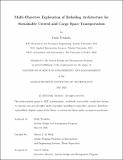Multi-Objective Exploration of Refueling Architecture for Sustainable Crewed and Cargo Space Transportation
Author(s)
Terakado, Daiki
DownloadThesis PDF (10.07Mb)
Advisor
de Weck, Olivier L.
Terms of use
Metadata
Show full item recordAbstract
This thesis presents a new integrated framework for evaluating in-space refueling architectures, focusing on their application to the human space missions such as Artemis. The framework tightly couples vehicle sizing with a boil-off control model, allowing the evaluation of various combinations of propellant types, refueling locations, and boil-off control. The model captures the dynamic interdependence between the components of the refueling system, the transport vehicle, the refueler, and the depot, using an iterative approach to ensure consistent mass estimates across configurations.
The framework is applied to analyze human landing system (HLS) architectures with refueling in cis-lunar space. The key findings highlight the mass savings benefits of cryocoolers, the benefits of high Isp with Lox/LH2, the benefits with NRHO refueling for acceptable ΔV requirement, and positive and negative effects of reusability in mass and mission time. Furthermore, the study indicates that the number of required refueling events is more sensitive to payload and refueler capacity than to boil-off losses.
To extend the framework toward long-term, scalable transportation solutions, the thesis compiles a comprehensive set of figures of merits (FoMs) and discusses future model extensions including risks, ISRU, and electric propulsion. Limitations such as lack of reusable configuration flexibility, and insufficient support for Mars mission parameters are identified as areas for future development. This work provides a foundational framework for the exploration of refueling architecture and solid next steps to design sustainable and scalable human space transportation systems.
Date issued
2025-05Department
System Design and Management Program.Publisher
Massachusetts Institute of Technology